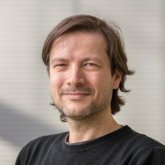3-year PostDoc Fellowship: Non-Invasive Biopsies of Skeletal Muscles via Advanced Bio-signal Processing and Machine Learning.
Are you passionate about creating pioneering non-invasive techniques that could replace traditional invasive biopsies for assessing musculoskeletal health? Do you want to develop wearable systems for continuous, in-depth monitoring of skeletal muscle structure and inflammation over long timescales (months or more)? Are you ready to push the boundaries of muscle monitoring and machine learning to shape the future of rehabilitation and robotic training?
The Neuro-Mechanical Modeling and Engineering Lab at the University of Twente invites applications for a 3-year postdoctoral position funded by the ERC Consolidator Grant ROBOREACTOR. This is an exciting opportunity to join a cutting-edge team at the intersection of neurophysiology, biomechanics, and rehabilitation robotics.
Project Overview
As a postdoctoral researcher in this project, you will work on breakthrough technology for non-invasive biopsies of skeletal muscles, specifically targeting the lower limbs. You will employ high-density electromyography (HD-EMG) and ultrasonography, combined with advanced statistical and machine learning techniques, to characterize muscle properties at multiple scales. Key focuses include:
- Motor unit phenotype distribution
- 3D muscle fascicle morphology
- Muscle inflammation levels
You will validate these non-invasive measurements against invasive biopsy samples and advanced imaging techniques, working with both healthy individuals and post-stroke survivors.
Key Responsibilities
- Longitudinal Experimentation: Help conduct 12-week studies with both healthy participants and stroke patients.
- Advanced Muscle Monitoring: Use HD-EMG, ultrasound (USG), and force dynamometry in combination with machine learning to predict structural and inflammatory changes in muscle over time.
- Data Analysis: Set up robust HD-EMG and USG data repositories for analysis and model training.
- Validation: validate noninvasive biopsy results against reference data derived from invasive biopsies.
- Collaborative Innovation: Work with experts in robotics, control engineering, and muscle biology to develop robotic rehabilitation technologies for skeletal tissue regeneration.
Information and application
Apply by November 28th, 2024. Applications must include the following documents:
- A video (2-minute max) describing your scientific interests and why you want to apply for this position.
- A cover letter (1-page max) specifying how your experience and skills match the position as well as summarizing work in your masters.
- A CV including English proficiency level, nationality, visa requirements, date of birth, experience overview, and publication list.
- Contact information for at least two academic references. A support letter will be requested only if your application is considered.
The first-round interview will be scheduled in the week of December 9th.
For questions, please contact Prof. Massimo Sartori, mail: m.sartori@utwente.nl. Please, only apply via the web platform and not via email.
About the organisation
The Faculty of Engineering Technology (ET) engages in education and research of Mechanical Engineering, Civil Engineering and Industrial Design Engineering. We enable society and industry to innovate and create value using efficient, solid and sustainable technology. We are part of a ‘people-first' university of technology, taking our place as an internationally leading center for smart production, processes and devices in five domains: Health Technology, Maintenance, Smart Regions, Smart Industry and Sustainable Resources. Our faculty is home to about 2,900 Bachelor's and Master's students, 550 employees and 150 PhD candidates. Our educational and research programmes are closely connected with UT research institutes Mesa+ Institute, TechMed Center and Digital Society Institute.




